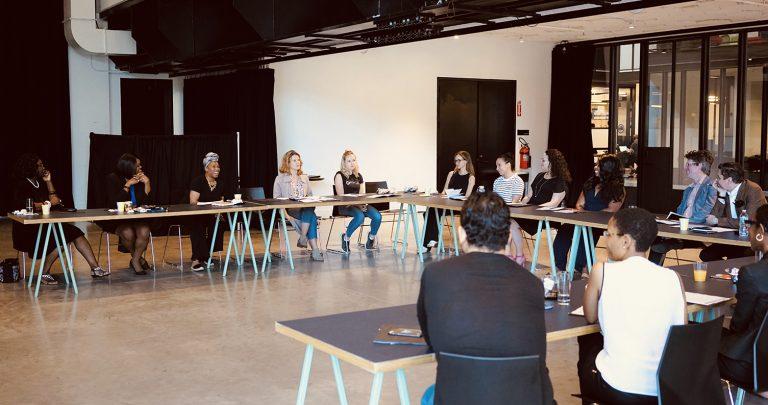By Matthew Putman
Sometimes, a round table gathering of close to twenty people can lose steam before the conversation even begins. But on Friday of last week, the profound impact of the group was palpable from the first words of introduction. As conversation took flight, it was clear that Dominique McDuffie, Director of Community Engagement at Nanotronics, had gathered a group of people with a shared passion.
Attendees included representatives from Medgar Evers, the Steam Center, the Brooklyn Navy Yard, New Lab, the Institute for International Leadership, Nonviolence in Service, the Intrepid Museum affiliated Goals for Girls, Work Train Fight, Brooklyn Workforce Innovations, and Nanotronics.
For Nanotronics, this meeting was a learning experience rather than a teaching experience. It was an opportunity for us to listen to the leaders of our community—the educators and mentors of the next generation of community leaders—about what we could do. Like all good conversations, the dialogue revolved around questions, not answers. What questions needed to be asked that no one was asking? What was our own vision missing? How could we become better mentors? How could we open our doors to the youngest members of our community? How could we learn from them? What did it mean to create access—and not only jobs? How did we find meaning in the work that we did?
We named the meeting “the Future of Access” only once it ended—because any other definition was too limiting. Everyone in the room was seeking access and openness. Intentions only become fruitful when we have access to the tools to realize them. Through that access can come something even more important: purpose.
As a future-looking company, we want to have access to the potential and creativity surrounding us, and to make sure that we are welcoming that talent to join our team. We know, just outside our doorstep, that young people are thinking of innovations and inventions that we could never imagine.
Finding that this group of leaders aligned on access, not on jobs alone was unique to me. I have spent the last three years speaking at conferences about automation and how it will affect jobs. I have often failed to communicate the creative potential of reducing “labor.” Surprisingly, we never had a single disagreement about this on Friday. The approach was to work our way from passion and purpose toward jobs and careers—and not the reverse. I had never seen the same confidence in potential before. We discussed discovering talent through challenges, reaching strength through vulnerability, and redefining the way we seek out and encourage potential.
Feeling inspired is not enough—so we left with some action items. I’m sure each of us had our own takeaways, but here are my calls to action:
1. Specialization
In a company and world that excels thanks to the creativity of generalists, we still need to find the words to define the next generation of specialists. This will require new job descriptions. How do you describe an opening for someone who can either program or work with robots?
2. Questions
Once we have created better job descriptions, and even set up interviews, what questions should we ask? How do we find out what is possible rather than what has already been done?
3. How can we work together?
Welcoming each other into our homes and offices, or into a gym, a school, or a museum for example, is the best way to promote discovery and dialogue. How do we open the gates to such spaces to those feel mistrust or intimidated when confronted by these structures? This is also part of the redefinition of access.
5. New Terms
We need to avoid judging candidates through the references—like titles and degrees—of an outdated (and broken) system. The future of access will be defined by new terms.
